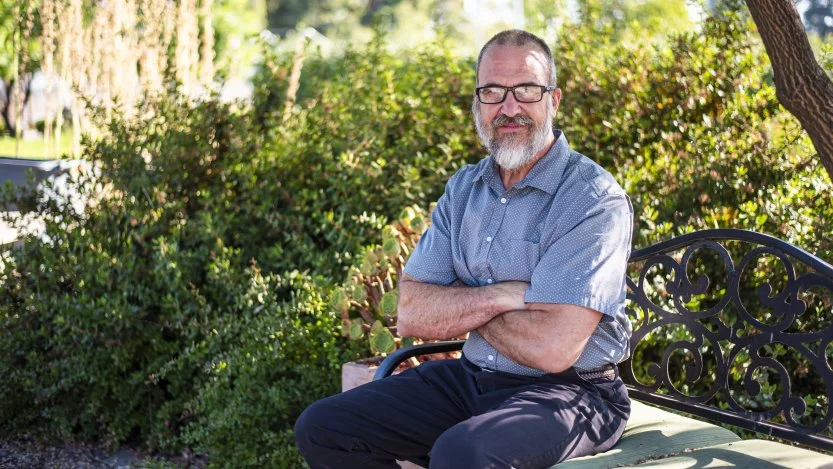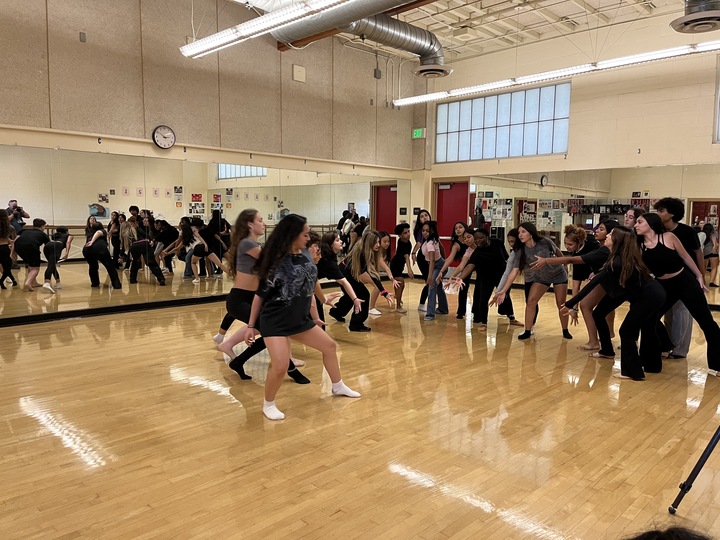
Bill Blanken, a chemistry professor at Reedley College, claims that a diversity and equity policy in California’s community colleges amounts to a “loyalty oath.”
Photo courtesy of Foundation for Individual Rights and Expression
Bill Blanken, a chemistry professor at Reedley College, said a new diversity and equity policy in California’s community colleges amounts to a “loyalty oath” and “compelled speech” that runs afoul of free speech and academic freedom.
Community colleges’ DEIA goals: address diversity and especially racism
The push for new diversity, equity, inclusion and accessibility (DEIA) policies came out of a long-running effort to improve student outcomes in California Community Colleges. The systemwide plan called Vision for Success outlined goals for improving transfer rates and other outcomes for students.
In 2019, the board of governors for the California Community Colleges voted in favor of establishing a framework for evaluating all its employees on their competency in serving a diverse student population. More than seven out of 10 students in the California Community College system are not white, according to 2022-23 enrollment data from community college’s Data Mart site.
But in the wake of the George Floyd protests in 2020, discussions over how to address diversity and especially racism on college campuses became more pointed. In August 2020, the Student Senate for the California Community Colleges held town halls where students could discuss the racism they had experienced on their college campuses and offer possible solutions.
These discussions led to Anti-Racism: A Student Plan of Action, a report which called for changes to the curriculum and for training of all college employees in areas of cultural diversity and concepts like unconscious bias.
During the first town hall, several students spoke about being assigned texts that contained racial epithets. Students said they did not object to the texts themselves, examples of which include “Letter from Birmingham Jail” by Martin Luther King, Jr. and John Steinbeck’s “Of Mice and Men.” The students said, however, that they objected because professors, who were not Black, read these epithets aloud. Other students said they did not take issue with being assigned white authors who held racist views, but that authors with opposing perspectives were excluded from the syllabus.
Some students detailed explicit racism they faced from professors.
Joseph Merchain, a student at Pasadena City Community College from South Los Angeles, said that as a Black man, he felt singled out when his professor told him that his dreadlocks were not professional in front of the class.
Merchain said, “So I’m taking a whole two-hour bus ride every morning and every night just to get to and from school, just to be racially profiled?”
Blanken, along with five other tenured professors in State Center Community College District, are challenging new California Community College diversity policies that change the way employees are evaluated. A lawsuit, filed in August, describes the plaintiffs as critics of anti-racism and diversity, equity, accessibility and inclusion (DEIA) principles who are concerned that these stances could result in negative performance evaluations or even losing their jobs.
“We need legal protection,” Blanken said in an interview with EdSource on Oct. 12.
Last year, the Board of Governors for the California Community Colleges adopted new regulations requiring local districts to evaluate employees, including faculty, on their competency in working with a diverse student population. Local districts were required to be in compliance last month.
Blanken disagrees with the DEIA policy’s premise that racism is embedded in institutions, including California’s community colleges, or in disciplines such as chemistry, math and physics. He argues that these fields should be taught in a way that is race- and gender-neutral. That is at the crux of the lawsuit by the six plaintiffs.
Filed by free speech advocacy group Foundation for Individual Rights and Expression (FIRE), the suit names California Community College Chancellor Sonya Christian, the board of governors of the California Community Colleges as well as the chancellor and governing board of State Center Community College District.
A related suit, filed in June on behalf of Bakersfield College history professor Daymon Johnson, targets the chancellor and board of the Kern Community College District.
State Center Community College District, which serves Fresno and surrounding central San Joaquin Valley communities, is one of the first districts in the state to include these new diversity requirements in its latest faculty contract. The district said in a statement that it will defend its implementation of the state’s DEIA regulations and its collaborative effort with the State Center Federation of Teachers.
“The District now and forever will be a welcoming place for a diverse population, with a commitment to access and inclusion,” wrote Jill Wagner, spokesperson for State Center Community College District. “DEIA initiatives have sparked many important conversations spanning decades, and as this issue continues to evolve, efforts to address them will continue to be at the forefront.”
The district’s new evaluation process requires instructional faculty to demonstrate “teaching and learning practices that reflect DEIA and anti-racist principles,” in addition to a written self-evaluation on the faculty’s “understanding” of DEIA competencies and “anti-racist principles,” with the goal of improving “equitable student outcomes and course completion.”
How these principles will play out in the next rounds of evaluation is still uncertain. Blanken said he has not received guidance from his department. A September memo by State Center’s human resources department noted that the district and academic senate have yet to develop uniform training guidelines for evaluations, and that meanwhile, “evaluatees should, in good faith, review the language in the contract and do their best to speak to how they have demonstrated or shown progress toward practices that embrace the DEIA principles.”
Daniel Ortner, the FIRE attorney representing the State Center professors said, “That’s not good enough when free speech is on the line.”
Ortner added that broad, undefined regulations could have a “chilling effect” on speech in the classroom. Plaintiffs are particularly concerned about a framework released by the California Community College Curriculum Committee that warns professors not to “‘weaponize’ academic freedom and academic integrity in an academic discipline or inflict curricular trauma” on historically marginalized students.
In the suit, plaintiffs said they have changed the way they teach their classes this semester because of the new DEIA policies. Loren Palsgaard, English professor at Madera Community College, said he will no longer assign texts that contain racial slurs, including Martin Luther King Jr.’s “Letter from Birmingham Jail” and works by William Faulkner and Flannery O’Connor.
A response filed on Oct. 2 by California Attorney General Rob Bonta, on behalf of thc chancellor and the board of governors challenges the claim the DEIA policies bar professors from using these texts, adding that this framework is not binding and only provides a reference for college districts creating their own DEIA policies.
The guidance “expresses competencies the Chancellor’s Office endorses, but does not require,” wrote Melissa Villarin, spokesperson for the state Chancellor’s Office. “The regulations do not impose penalties on district employees. They are intended to contribute to employee professional development.”
Erwin Chemerinsky, dean of the UC Berkeley School of Law, said that it is well within a college’s rights to not only prescribe the curriculum for courses but to insist that faculty be sensitive to teaching a diverse student body. He added, however, that schools cannot require that faculty espouse a particular viewpoint in their teaching.
“The question is whether this is more the former than the latter,” Chemerinsky wrote in an email to EdSource, adding that he believes the government has a strong argument that this is within its realm of prescribing a curriculum.
“It is hard to say on this record that the First Amendment has been violated,” Chemerisky wrote. “It would be different if a teacher was being disciplined and bringing a challenge.” None of the plaintiffs in the suits has been disciplined.
A separate suit, filed by the Institute for Free Speech on behalf of Bakersfield College professor Daymon Johnson, points to the firing of Matthew Garrett, a professor who had been critical of DEIA initiatives. Garrett was not subject to new DEIA policies affecting faculty evaluations. However, Johnson’s suit claims that he worries that he, too, could lose his job, because he shares many of the same conservative values and anti-DEIA stances as Garrett.
The Kern Community College District said in a statement that Garrett was not terminated because of his opinions on DEIA or other free speech issues.
“Matthew Garrett was terminated after a lengthy and detailed examination of his disciplinary violations at Bakersfield College,” said district spokesperson Norma Rojas.
Garrett, who was terminated by the college in April 2023, contests these alleged disciplinary violations. He filed a lawsuit against the college in May 2021, claiming that he faced retaliation for exercising his free speech. He said in a statement to EdSource, that the district has “fabricated an absurd pretext that simply does not hold up under scrutiny.”
Plaintiffs in both suits have asked the court for a preliminary injunction that would prevent the California Community Colleges’ DEIA policy — as well as State Center Community College District’s faculty contract — from going into immediate effect. The request remains pending in federal court, and no hearing date is currently set.
Ortner said he is not aware of any other lawsuits from California’s 116 community colleges that are targeting the new DEIA policies, but he’s keeping his eye on the issue statewide.
“A lot of colleges have anti-discrimination protections that make students feel welcome, such as tutoring, mentoring. There are a lot of things that you can do that don’t impinge on free speech,” Ortner said. “California colleges are much more aggressive and forward in advocating for these principles.”
Editors’ note: This story has been updated to include a statement from Matthew Garrett.

